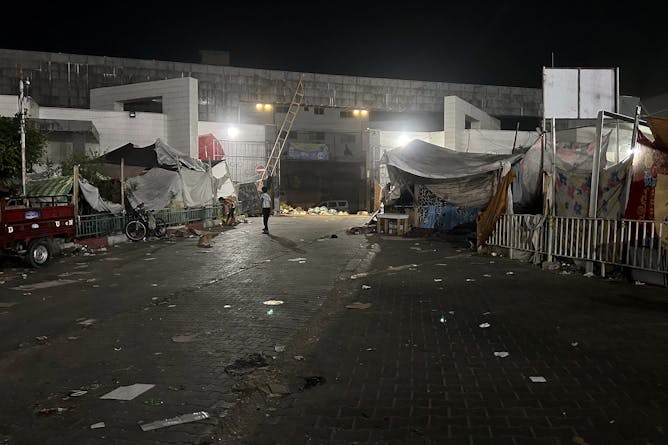|
One of my favorite quotes comes from playwright Tom Stoppard.
“Words are sacred,” he writes. “They deserve respect. If you get the right ones, in the right order, you can nudge the world a little.”
In other words: Words matter. So, when we edit stories here, we spend a lot of time looking at not just structure and whether a scholar has backed up their assertions. We look at word choice. That careful approach actually led us to commission a story about the choice of a word used by both sides in the Israel-Hamas war: genocide. We wanted to help readers understand, was it accurate to use this word to describe the actions by either Israel or Hamas?
That question led editor Amy Lieberman to scholar Alexander Hinton, who is the director of the Center for the Study of Genocide and Human Rights at Rutgers University-Newark. Hinton understood the need for clarity about the word. “As the Israel-Hamas conflict grinds on amid continuing genocide allegations,” he writes in his story, “it’s crucial to understand what genocide actually is and how this term has been used for political purposes in the past.”
Hinton examines the initial meaning of the word, starting from when Raphael Lemkin, a Polish-Jewish lawyer, devised it in 1944. But he points out that words don’t exist in a vacuum, and the political use and abuse of the word have purposely obscured its meaning: “There is also a long history of government officials arguing about the definition of genocide to deny that it was actually happening.”
|

People holding signs calling for an end to genocide in the Gaza Strip have been a common occurrence at pro-Palestinian protests.
Christoph Reichwein/picture alliance via Getty Images
Alexander Hinton, Rutgers University - Newark
People talk about genocide in a few different ways, ranging from technical to colloquial – but a war of words does not replace a path to peace, a genocide scholar writes.
|

The exterior of Shifa hospital in Gaza City is seen on Nov. 10, 2023, amid ongoing battles between Israel and Hamas near the facility.
AFP via Getty Images
Benjamin Jensen, American University School of International Service
The Taliban and the Islamic State group are among the militant groups that have been known to use civilians as human shields in the past, in order to try to shift their opponents’ war calculations.
|

About 20% of counties in the South are marked by “persistent poverty.”
Boogich/iStock/Getty Images Plus
Peter A. Coclanis, University of North Carolina at Chapel Hill; Louis M. Kyriakoudes, Middle Tennessee State University
After a 20th-century manufacturing boom, the region has been in a decadeslong decline. Rural factory towns can blame technology and globalization for their woes.
|
|
|

Ozgur Ozkan, Tufts University
Turkey and Israel exchanged tit-for-tat diplomatic withdrawals over President Recep Tayyip Erdogan’s pro-Hamas stance in the regional conflict. But behind that, the picture is more nuanced.
| |

Jessica L. Adler, Florida International University
Higher jail mortality is related to jail turnover rates and demographics.
|

Xavier Medina Vidal, University of Texas at Arlington; Christopher Chambers-Ju, University of Texas at Arlington
Women represent half of Mexico’s Congress and hold key positions in politics and the judiciary. But the country is still dogged by high rates of femicide.
| |

Susan Smith-Peter, City University of New York
Hawkish foreign policy wonks have called for a breakup of Russia. But would that fall into Beijing’s hands?
|
|
|
|
|
-
Matt Williams, The Conversation
Scholars writing for The Conversation take a deeper look at some of the issues expected to be on the agenda when the leaders of the world’s two biggest economies meet.
-
Elise J. Bean, Wayne State University
The convictions of two former Trump aides who refused to comply with the House Jan. 6 committee’s information requests could revive a potent tool for holding powerful people accountable.
-
Maha Nassar, University of Arizona
The slogan has been attacked as ‘antisemitic’ and defended as a ‘call for freedom.’ Behind the controversy is decades of usage.
-
Mona Tajali, Agnes Scott College
Iranian women are still pressing for women’s rights and equality, just in quieter forms, including not wearing mandatory hair covers. Imprisoned activists are also leaking messages to others.
|
|